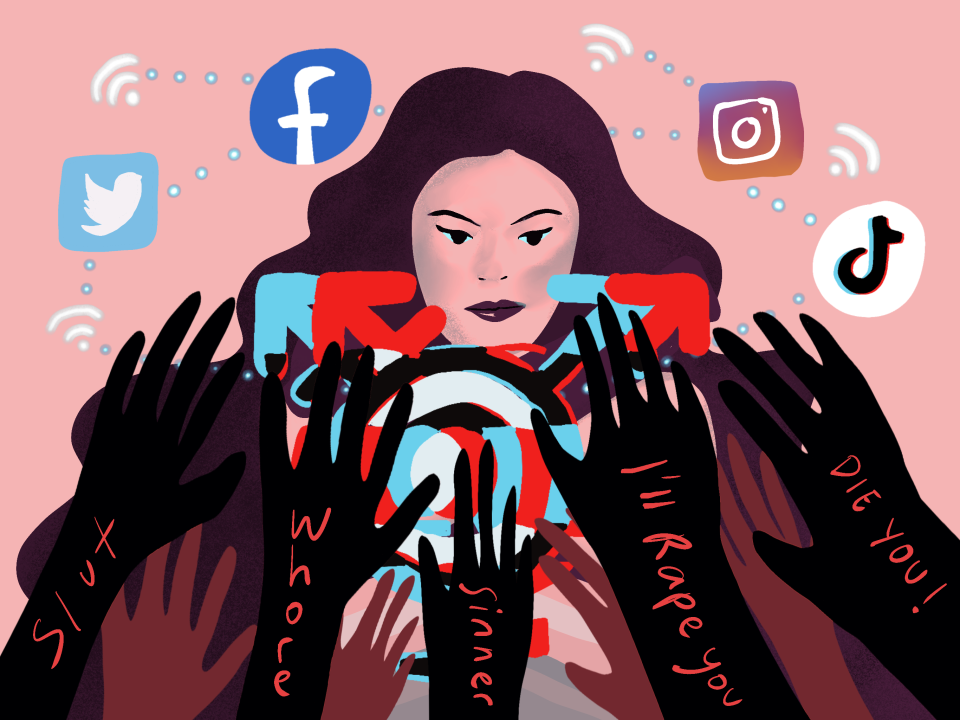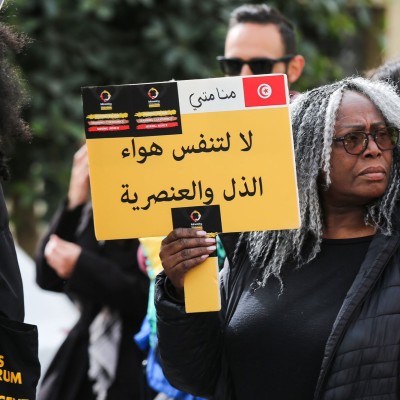The Manosphere and the Rise of Violent Misogyny Online

Ninar Fawal
It might be tempting to view the emergence of Arab misogynistic “red pill” movement as a mere reproduction of European or American discourses within a widening global manosphere. Yet a closer look reveals that, while adopting the symbols and labels of other red pill movements, the Arab manosphere adapts its arguments into a broader culture war between what it perceives as the “liberal West” and Arab countries. In this way, online misogyny is not a phenomenon that is isolated from other trends: instead, it is repackaged into wider conspiratorial traditionalist discourse on the internet that specifically caters to the current sociopolitical context in the Middle East and North Africa. This traditionalist discourse is concerned with modern societal ills and advocating for the return of traditional social, economic, political structures – and most importantly, gender politics.
The global manosphere and its influencers
The manosphere movement is amorphous – oscillating between different labels, sub-groups, and platforms – but it agrees upon a number of premises and foundational principles: namely, misogyny, anti-feminism, and anti-liberalism more broadly.
It is characterized by far-right, conspiratorial extremism, and has found loyal (largely male) followers all around the world. It is dubbed the “manosphere, literally, for its focus on men and its defence of their perceived interests.
According to a recent analysis of millions of posts in a number of forums in Reddit, the online manosphere can be divided into four general groups: “pick-up artists,” “men’s right’s activists (MRAs),” “men going their own way (MGTOW),” and “incels.” Pick-up artists advice men online on how to pick up men and decry the perceived “feminization” of men today; MRAs argue that men are routinely discriminated against; MGTOWs support withdrawal from women and society and is often associated with extreme misogyny; and incels are generally characterized by intense resentment towards women, and is a community that has often been associated with mass murderers such as Elliot Rodger and Alek Minassian.
One core belief in the broader manosphere movement is that of the “red pill.” The concept references the film The Matrix, wherein the protagonist Neo is invited to choose between a red pill and a blue pill. The former reveals the truth about the world they inhabit and the “matrix” that controls it, the latter, a continued blissful ignorance. The manosphere movement borrows from this premise, but with an important twist. For many of its followers, the matrix is an imagined liberal, feminist world order perpetuated by a nefarious, shadowy entity. The red pill, on the other hand, is “waking up” to this reality. In this sense, feminism is institutionalized and structural, and is, as a result, the root cause of the societal, economic, political, and spiritual ills that befall men and larger society.
If the manosphere movement has been bubbling in different corners of the internet like Reddit, 4chan, 8chan, and the like, then Andrew Tate helped bring it out into the mainstream platforms of Facebook, Instagram, Twitter, and importantly, Tik Tok. A former British-American kickboxer, he is now one of the most googled people on Earth, with more than 11.6 billion views on TikTok. Tate’s journey to fame has largely been dependent on the physical and sexual abuse of women: he first gained notoriety in 2016 after he was kicked off the British reality show Big Brother due to a video emerging of him physically abusing a woman.
In 2018, he launched a $450 video course on how to attract women (and coerce them into sex work) which he dubbed the PhD (Pimping Hoes Degree) program. In 2021, he founded another grift by the name of Hustlers University – the website inviting you to “escape the matrix” – now registering over 200,000 students.
One year later, his content exploded online – with platforms like Tik Tok actively promoting his and other manosphere content. His most infamous comments include blaming victims for being sexually assaulted, comparing women to dogs as to assert ownership over them, and fantasizing over murdering a woman with a machete if she accused him of cheating.
Another well-known manosphere-related influencer is Jordan Peterson, who has found popularity particularly among young men in the Middle East and North Africa. A Canadian psychologist and former professor at the University of Toronto, his best-selling book 12 Rules of Life primarily focuses on self-help content, packaged in a conservative, traditionalist framework. On gender politics, he is staunchly anti-feminist – opining in a New York Times profile that “the masculine spirit is under assault” – and largely gained notoriety for his panics about gender identity.
One of the widespread phenomena within the manosphere movement is the dominance of pseudoscience theories. Coupled with gender essentialism, these communities often misuse evolutionary psychology to justify their violent misogyny. For example, what is known as the “dual mate strategy hypothesis” which is a hypothesis that examines the female ovulatory cycle in mammals and its impact on mating preferences. This hypothesis was used by manosphere circles to reinforce myths that women actively cheat with good-looking men, known in the community as “alphas,” in order to “obtain good genes” because her biology compels her to. Indeed, this is one example of “evidence-based misogyny” that scholars observe in manosphere communities online, where statistics, studies, and other forms of evidence, real or otherwise, are used to bolster narratives of men’s supremacy and their vicitimization in society. This accompanies a broader conspiratorial narrative that gender equality feminism are key components of the “culture war” designed to harm boys and men.
Growing Arab audiences of the manosphere
As these ideas and rhetoric grew in popularity globally, the Arabic manosphere has also found increasing online presence and engagement. The emergence of this manosphere is, on one hand, a result of translating the content of well-known manosphere influencers, some of whom have emphasized their fondness of Islam and Muslims.
On Youtube, there are countless translated videos of Andrew Tate, which can bring in hundreds of thousands of views. When Andrew Tate converted to Islam in 2022, some Arabs online reacted positively. One religious figure praised how Tate’s conversion led to the conversion of his fans.
Another YouTube personality with 1.12 million subscribers made a video mocking feminists’ reaction to Tate’s conversion. Many of Tate’s videos are translated by a Youtube Channel called Alasna ala al Haq, or Are We Not Right? which defines itself in its description that it seeks to shed light on “Islam’s incompatibility with liberalism, feminism, and other modern lifestyles.”
In one of the translated videos, Tate explains the reasoning behind his conversion, stating that Islam reflects his personal beliefs that God is a strong and fear-inducing figure, unlike what he perceives is the permissiveness of Christianity. At other times, he tied his conversion to the “decline” of the West. He also stated that “I’m going to find myself a nice Islamic wife, and I’ll build up a big pile of rocks… as soon as I catch her cheating, there’s going to be no delays, insha’ Allah,” implying that he is prepared to stone his wife if she is caught cheating.
Another channel, called Hayat Tate or the Life of Tate, dedicates its account to translating videos of the influencer, mainly consisting of YouTube shorts. Similarly, Jordan Peterson has long flirted with Muslim audiences, both in the Arab world and elsewhere, stating once that he was happy with the size of his Arab audience, and that Muslim fans would leave comments on his videos asking when he would convert to Islam.
Manosphere influencers reach out to Arabs and Muslims
The other factor influencing the emergence and the spread of the Arabic manosphere is the new ideas and influencers it produced in its effort to adapt to the Middle East and North African context.
In this way, there is a juxtaposition of liberalism and feminism with Islam to counter what is perceived as the former two’s increasing encroachment on Arab societies. For example, Western criticisms of Qatari’s “Arab and Muslim social norms” in the lead up to the 2022 FIFA World Cup ignited fierce debates (and largely, backlash) on gender, feminism, and particularly LGBTQ+ matters in the Arab manosphere.
This, in turn, allowed for increased engagement with manosphere figures. For example, this is a translated YouTube video of Andrew and Tristan Tate discussing Qatar’s treatment of LGBTQ+ issues went viral, boasting 1.9 million views. In April 2022, the Saudi media company Thamanyah's podcast, Finjan, which is one of the most popular podcasts in Arabic, interviewed the British-Egyptian influencer Mohammad Hijab.
Hijab is a friend of Tate and well known by his opposition to feminism and women’s liberation movements. He and Tate held a live discussion where they discussed the latter’s conversion to Islam (the original version reached 3.5 million views, and Arabic translations of the conversation were also highly watched).
In this discussion, they spoke about Tate’s conversion, Tate’s anti-women comments, and how feminism and gender equality has a “hidden agenda” that negatively impacts women’s physical and mental health, a citing a mixture of studies, surveys, and anecdotes. The conspiratorial undercurrent to this conversion once again described gender equality as a project of the (Western) elite juxtaposed to traditional Muslim societies.
Jordan Peterson videos, similarly, get translated into Arabic and garner millions of views: one such video, which is a compilation of Peterson critiquing gender equality, punctuated by comments in Arabic by the uploader, has 2.2 million views. It examines themes of perceived unfairness in the workplace, which aligns with Peterson’s rhetoric on men’s disadvantaged nature today, as well as rhetoric that positions feminism as being incompatible with childrearing and the nuclear family. Peterson, however, has fallen out of favour with his Arab audience recently due to, initially, his address to his Muslim audience about sectarianism and the Abraham Accords, which was perceived as condescending and ignorant. And then, after October 7, his comments on Palestinians further angered his Arab and Muslim audience. Tate, on the other hand, continues to capitalize on his embrace by Muslims after his conversion.
The Arab manosphere
As a result of the recent explosion of these narratives and influencers, Arab content creators now also produce their own red pill or red pill-influenced content. Sometimes, the content is less niche and encapsulates anti-feminism in general, proliferated through figures such as Faris Al Hammadi, a popular internet personality and religious influencer from the United Arab Emirates who supported Tate’s conversion to Islam. Al Hammadi, like Hijab, often peddles content that focuses on the supposed incompatibility between Islam and gender equality. In July 2023, for example, he tweeted that:
Allah orders men to be merciful towards women. And orders women to be obedient towards men. Mess around with this equation, you’ll end up destroying a society.
Other forms of content are more directly about red pill concepts and ideologies. The Moroccan YouTube channel ossagi | أوساجي boasts 1.63 million subscribers and says it seeks to help the viewer improve their mindset, personality, and overall life.
Its self-help style videos are numerous, echoing prominent figures like Jordan Peterson; its explainer video on the red pill movement shows how the ideology uncovers the oppressive force of feminism and its goal of enslaving men. Similarly, a Moroccan podcast called the “Testosterone Podcast,” under the YouTube channel ilyass Lakhrissi, has garnered hundreds of thousands of views on topics regarding masculinity and anti-feminism.
There have also been red pill influencers selling courses, similar to Hustlers University: a Jordanian man by the name of Coach Kareem offers a number of services, including consultations on relationship issues and opportunities to give lectures on the “history of feminism” and “biological and psychological differences” between men and women. Moreover, across Facebook, there are a number of groups dedicated to red pill content, both public and private: Red Pill Arabic, for example, has 184,000 followers and espouses misogynistic, manosphere-related views; The Real world أندرو تيت has 273,000 followers. One of the former’s more popular posts describes women’s “biological clocks” and warns men from their deceitfulness while employing the “dual mating strategy” hypothesis, directly referencing terminology popular in red pill online forums. Other significant groups includeأندرو تيت بالعربي, red pill islamic 💊💊 (النخبة) ريد بيل إسلامي, and Escape The Matrix - الهروب من المصفوفة (ETM), all of which peddle similar extreme misogyny and men’s supremacy, both using religious and non-religious justifications (for example, one post references the hadith that the minority of inhabitants in heaven are women).
Conclusion
Anti-feminist content has indeed always existed online, in all languages and speaking to all social and cultural contexts. This new crop of influencers, however, have had particular influence and popularity online in recent years.
Indeed, what is particularly alarming about the manosphere, aside from the overt and covert violence of its influencers and ideologies, is it its sheer virality of both its original and translated content, as well the ability of worldwide content creators to adapt its messages to their own audiences.
Indeed, the Arabic manosphere’s positioning of feminism as antithetical to Islam is both a response to perceived Western influence as well as a mirroring of the West’s own recent culture wars on gender and sexuality, which has dominated American political culture. Still, the proliferation of gender misinformation and disinformation is critically not solely a manifestation of culture war, and while it tempting to think that trends online are frivolous and unimportant, this dehumanization of girls and women could indeed could potentially impact rates of femicide, domestic violence, and the restriction of rights and freedoms for women and girls (already, schoolteachers in English-speaking countries are sounding the alarm on the impact of Tate’s videos on violent incidents in elementary schools).
While Tate is one person who remains under custody, the social movement he helped popularize is still very much rampant on the online sphere – with more figures like him across the world ready to take his place.





